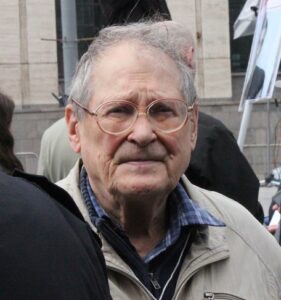Sergei Kovalev (2.03.1930 – 9.08.2021)

Human rights activist, biologist, board member of International Memorial (banned in Russia since January 2022).
August 9 marks a year without one of Russia’s greatest moral authorities. Sergei Kovalev, a close friend of Andrei Sakharov and his wife Elena Bonner, died one year ago, on August 9, 2021.
“A free Russia, without repression or arbitrary use of law” was Kovalev’s dream, to which he dedicated his entire life.
In the 1990s, at the time of the First Chechen War, Russian journalists demanded to know why Kovalev only focused on the human rights violations of Chechens, not on those of Russian people. “This is simply untrue,” came his reply.
In 2005, he was asked a similar question:
“Why do you so hate Russians and always speak in defense of those who hate Russians and fight against them? You keep defending Chechen bandits, Latvian fascists and Russophobes of all creeds.”
To that Kovalev responded:
“I never defended specifically Uzbeks, or Latvians, or Russians. I always defended those who needed defense. I follow the Declaration of Human Rights, which is very clear on the subject: regardless of gender, age, language, religion, or race.”
Kovalev added:
“You are mistaken to say that Russians were never an object of my human rights defense. We defended them – in the Baltics, and, indeed, in Budyonovsk. We fought for release of two thousand Russian hostages held at Budyonovsk hospital…”
Similar to Andrei Sakharov, Kovalev started out as a political activist in the 1960s, trying to force the Soviet authorities to adhere to the Soviet Constitution and other legal treaties, to which the Soviet Union was a signatory.
“This type of protest is far more ethically acceptable to me than undercover agitation and violence,” said Kovalev.
Since the 1960s, Kovalev was one of the editors of the Chronicle of Current Events that kept track of human rights violations in the USSR. Despite continuous blackmail and threats by the KGB, Kovalev felt it morally imperative to keep informing the world about human rights abuse in the Soviet Union.
Arrested in December 1974, Kovalev was tried in Vilnius a year later, charged with “anti-Soviet agitation.” On the very day in 1975 that the words of Sakharov’s Nobel lecture were galvanizing the audience in Oslo, Sakharov (who himself was banned from travelling to Oslo to accept his Nobel Peace Prize) was showing his support to Kovalev. He stood outside the courthouse in Vilnius where the Soviet authorities were doing their utmost to silence the unyielding Kovalev. So great was the fear of the brave man that Kovalev was even denied his last plea. Serving his sentence of seven years of hard labor and three years of exile, Kovalev returned to Moscow during Gorbachev’s Perestroika.
On Andrei Sakharov’s insistence, Kovalev ran and was elected deputy of the People’s Congress. Kovalev was one of the authors of the Russia’s human rights declaration and the first human rights’ ombudsman in Russia’s history. He served as Chair of the Human Rights Commission of the President’s office but following his sharp critique of Yeltsin’s “bloody and senseless” strategy in the Chechen war, he resigned from his post.
Already in early 2000, during the brief period of a caretaker government, Kovalev’s foresight led him to state that if Putin were to come to power, this would open a path to “an authoritarian, police state where the security services would be at the helm.”
In March 2010, Kovalev became one of the original 34 signatories of the public petition, “Putin must go,” alongside Elena Bonner, Boris Nemtsov, Garry Kasparov, Andrei Illarionov, Ilya Yashin and others.
In his interview in March 2020, Kovalev warned in the strongest terms of the dangers of criticizing Ukraine for its alleged fascist and banderovite tendencies. Kovalev did not live to see the descent of Russia into a senseless and bloody war, but he foresaw the risks with the utmost clarity. “Democracy is not the will of the people,” he said. “Democracy is freedom and right of minorities, including political minorities, to express their views and compete for the approval of the majority – without hindrance, honestly, openly. To compete with the political incumbents and other opponents.”
“Motherland is not a geographical term, nor is it an ideology,” stated the Yugoslav philosopher Mihajlo Mihajlov. “Motherland is freedom.” Ever a free spirit, Kovalev was an outstanding patriot of Russia, leaving his compatriots a priceless legacy.
